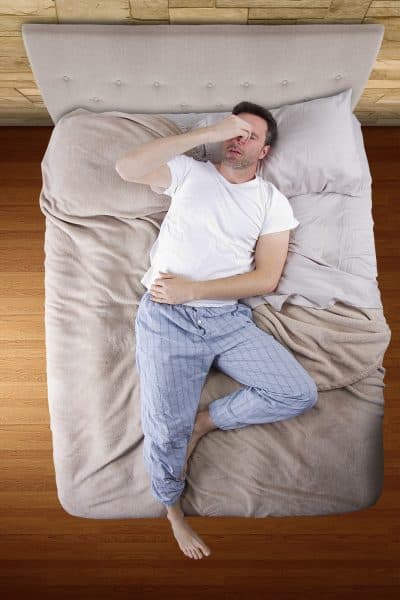Nobody relishes insomnia, but unfortunately it is something that everyone struggles with at some point in their life. The occasional sleepless night is annoying but bearable. On the other hand, chronic sleep problems can severely damage your quality of life. As a matter of fact, lack of sleep has the potential to cause a long list of serious problems, ranging from things like poor concentration to obesity. Sleep truly is the foundation for a healthy mind and body, and it is essential for disease prevention. To illustrate, a long-term pattern of inadequate sleep increases your risk for diabetes, heart attack, stroke, and respiratory illness.
Although being aware of the problems caused by sleep deficiency is important, the most pressing need is to restore your quality of life by enabling you to sleep soundly. In order to do this, the first step is understanding how to get your sleep schedule back on track. You will find descriptions of seven actionable, proven strategies for improving sleep quality in the list below, as well as tips to help you implement them. After all, being empowered with knowledge plays a huge role in finding your best health and making the lifestyle changes necessary for recovery.
EXPERT-APPROVED WAYS TO GET BETTER SLEEP NATURALLY
If you struggle with sleep, know that you are not alone. Approximately 50 to 70 million Americans struggle with disordered sleep symptoms like intermittent nighttime wakefulness, insomnia, and poor sleep quality. Similarly, insufficient sleep in Canadians aged 18 to 79 is alarmingly common. Although these are rather grim statistics, the encouraging truth is that there are many things you can do to help.
1. Make Sure You’re Getting Enough Magnesium
The magnitude of health problems resulting from magnesium deficiency may surprise you. To put things in context, it is important to realize that magnesium is responsible for the very processes that your body needs to be alive and well. Specifically, magnesium is essential for protein synthesis, hormonal balance, energy creation, and nerve and muscle functioning. Chronic magnesium deficiency can trigger premature hair loss, weaken your immune system, and impair the functioning of your heart, bones, muscles, and nerves. It may also leave you susceptible to developing an autoimmune disease.

Studies have also recorded a link between poor sleep and low magnesium levels. Conversely, they have also confirmed that magnesium supplements promote better sleep. For example, consider the results of the following study published in the Journal of Research in Medical Sciences: adults who took two supplements containing 414mg of magnesium daily experienced relief from insomnia and a higher overall sleep quality.
According to the US Department Of Health & Human Services, adults between the ages of 31 and 50 should get a minimum of between 320mg and 420mg of magnesium everyday. But keep in mind that a variety of factors can make it harder for your body to absorb and store magnesium. For example, oral contraceptives and other medications may create magnesium deficiency. Furthermore, health conditions such as diabetes, high blood pressure, and chronic excessive alcohol consumption undermine your body’s ability to sustain adequate levels of magnesium.
In order to make sure you are getting enough magnesium, I recommend eating more magnesium-rich foods like almonds, avocados, bananas, yogurt, and spinach. You can also take daily magnesium supplements. When selecting a magnesium supplement, look for a bottle that reads “Magnesium Oxide.”
2. Give Yourself a Minimum of Two Hours of Light Exposure Per Day
Your body’s circadian rhythm, or biological clock, governs your natural sleep-wake cycle. When you are in tune with your own unique rhythm, things like getting up in the morning, falling asleep at night, and staying asleep through the entire night is much easier.
You can help “fine tune” your unique biological clock by exposing yourself to sunlight for at least two hours a day, especially first thing in the morning.

Getting in touch with sunlight right away helps your brain realize that it is time to wake up and focus. As an added bonus, the sun is an excellent source of Vitamin D, which naturally enhances sleep.
If it is difficult for you to be in natural sunlight for a straight two hour stretch of time each day, you may find it helpful to break those two hours down into more manageable lengths. It is critical to intersperse movement throughout your day anyway, even if you have a job that requires you to sit in one place.

You can increase your sunlight exposure by biking to work, having “walking meetings” outside with colleagues, and simply eating lunch outside. It is often easier to find small chunks of time to focus on your health.
Not everyone has readily available sunlight access. A highly effective alternative to sunlight is sustained exposure to bright lights in your daytime environment. In fact, light therapy has been shown to improve sleep deprivation disorders.
According to one study, adults suffering from insomnia were able to sleep an average of two hours longer after regular exposure to bright lights. These same adults also shortened the length of time it took them to fall asleep by an impressive 83%! Another study involving older adults with insomnia found similar results. On average, just two hours of bright light exposure per day reduced nighttime wakefulness in geriatric patients and helped them sleep longer, too. It also improved sleep efficiency, a term that refers to the amount of time a person is actually sleeping while in bed.
Additional benefits of exposure to sunlight or artificial bright lights during the day include feeling energized, being more alert and focused, and experiencing an overall better mood.

3. Avoid Caffeine After Lunch
Caffeinated beverages like coffee and tea are stimulants, meaning that they speed up your nervous system. You likely experience this as an increase in energy and mental alertness. While this might seem like a good idea when you are feeling sluggish after lunch, afternoon caffeine could be jeopardizing your ability to sleep at night. This is because it can remain in your body for up to eight hours! According to the Journal of Clinical Sleep Medicine, consuming caffeine six hours before bedtime markedly disrupts sleep quality.
Substitute caffeine-free beverages for caffeinated coffee, tea, or soft drinks in the afternoon. For example, decaf coffee and teas are easy alternatives. If you are accustomed to drinking soft drinks in the afternoon, try squeezing lemon or lime juice into a refreshing glass of carbonated water. You can even muddle berries into the water for a stronger flavor. (Soft drinks are best avoided altogether, so this could be a way of activating another healthy habit: abstaining from soda.)

You may wonder how you will get your “afternoon energy” without caffeine. In truth, it is easier to find more sustainable energy by taking a brisk walk or spending five to ten minutes stretching instead of relying on an external substance like coffee. You can also help prevent afternoon fatigue by staying well-hydrated. Additionally, eating certain types of foods, like bananas or apples, will help you feel more awake.
4. Exercise Every Day
Even if it is only twenty minutes, daily exercise can work wonders for insomnia. Multiple studies have shown that various forms of exercise enhance sleep quality. In other words, you are not limited to one type of exercise alone to harness exercise’s natural power to put you to sleep at night. Both low-impact exercises like walking and high intensity resistance exercises have proven to be beneficial for people who suffer from insomnia.

In one study involving over 300 participants, individuals adhered to either moderately intense aerobic or high intensity resistance exercise programs for the duration of ten to sixteen weeks. Compared to the control group, the exercise group demonstrated a greatly diminished reliance on sleep medications. They also fell asleep more quickly and easily at bedtime.

Exercise, like caffeine, often makes you feel more alert and energized. This is because it releases two stimulatory hormones called adrenaline and epinephrine. Interestingly, the results of multiple scientific studies like this one and this one reveal that exercising at night is just as helpful as exercising during the morning or afternoon. In these studies, it did not delay sleep at bedtime.
But everybody is different, so evening exercise may or may not provoke insomnia. Because of this, it is wise to avoid evening exercise in the beginning. At the very least, try to leave a three-hour time period between exercise and bedtime.
5. Avoid Devices that Emit Blue Light Before Bedtime
This is a fundamental rule for good sleep hygiene, but it is often hard to follow in a culture so imbued with technology. Electronic devices like mobile phones, laptops, and televisions emit light within the blue wavelength. The problem is that blue light tricks your brain into thinking it is daytime, which prevents your brain from producing the sleep hormone called melatonin.
Exposure to blue light before bedtime can also reduce the quality of your sleep. When possible, aim to avoid blue light exposure within three hours of bedtime. Since red light does not hurt melatonin production, consider using dim red lights at night. Activities like knitting or reading are excellent alternatives to watching TV or playing computer games.
It is best to turn off the main lights and avoid screen time altogether, but you might be relieved to know that there are multiple ways technology has “fixed the blue light problem.” One solution is to wear special glasses that shield your eyes from blue light.
There are also apps you can download to block the blue lights on both your phone and computer.

6. Follow a Consistent Morning and Evening Routine
Again, this one is all about preserving your internal biological clock. As is the case with many health problems, honoring your body’s innate ability to self-regulate is an extremely effective way to find relief!
Everyone has a slightly different circadian rhythm, but nobody is immune to the damage that irregular sleep patterns can have on their biological clock. Sporadic sleep-wake times harm melatonin production and long-term irregular sleep can really mess with your body’s circadian rhythm, making it even more difficult to establish a routine in which you regularly attain quality sleep.

One example of this is published in the Journal of Sleep Research. Researchers studied more than 6,631 participants, finding that individuals with irregular sleep patterns experience less fulfilling sleep and endure excessive daytime drowsiness. And, since sleep governs the health of many systems in your body, the complications extend far beyond feeling tired or being unable to sleep. In addition to poor sleep quality and fatigue, participants with an inconsistent sleep schedule also experienced poor concentration, difficulty regulating emotions, and a reduced ability to concentrate and perform well in school.
The long-term benefits of a consistent sleep pattern include deeper, more restful sleep that makes you feel refreshed and rejuvenated when you’re awake. A consistent sleep schedule also makes it easier to both fall asleep at night and get out of bed in the morning.
7. Engage in Relaxing Activities to Reduce Anxiety at Night
Often, anxiety is the culprit of insomnia. And once anxiety has caused a few nights of insomnia in a row, it is common for people to become even more anxious about not being able to fall asleep. To make matters worse, lack of sleep worsens anxiety. Stressing out about falling asleep will probably not improve the situation. In fact, it will likely make sleep seem even more unattainable.
The good news is that there are multiple steps you can take every night to self-soothe and calm yourself down. Evidence shows that a nighttime routine involving relaxing music, guided imagery, and progressive muscle relaxation is an effective treatment solution for insomnia. You may also find relief from soothing activities like meditation, drinking chamomile tea, reading, and taking a hot bath. Diffusing certain types of essential oils, like lavender or frankincense, are also known to relax the mind and promote quality sleep.
Another option is autogenic training, a relaxation method consisting of physical exercises and long, deep breathing. It is effective for treating health problems that are exacerbated by stress and anxiety, like headaches or infertility.
As always, there are a number of reputable scientific studies that back up the validity of these recommended strategies. One example is a comprehensive meta-analysis of 73 studies related to autogenic training. In it, researchers state that this technique is indeed an effective way to relieve psychological issues like anxiety.

Another study, published in the Journal of Psychosomatic Research, evaluated women who were having trouble conceiving. They found that autogenic training significantly improved participants’ abilities to conceive after practicing the technique for four months.
Of course, autogenic training is just one relaxation technique. You have plenty more options for anxiety reduction!

Ultimately, treating anxiety is a personal issue and you get to build your own unique relaxation routine based on whatever relaxes you the most.
GET PROFESSIONAL HELP FOR STUBBORN SLEEP PROBLEMS AT THE DEMPSTER CLINIC- CENTER FOR FUNCTIONAL MEDICINE
Rebuilding a healthy sleep schedule and recovering from chronic insomnia is no small feat. While the strategies discussed above are helpful, they are just the tip of the iceberg. Some people find the greatest relief from insomnia by using remedies like CBD. Others can finally sleep well after healing their unresolved PTSD. Severe or chronic sleep problems may be more appropriately treated with the help of an experienced functional medicine practitioner.
Whether you have been experiencing a severe degree of sleep disturbance for a long time or you just want to squash that new streak of insomnia as quickly as possible, I encourage you to schedule an appointment at my clinic. At The Dempster Clinic- Center for Functional Medicine, we offer a variety of approaches for finding natural sleep aids that are customized to your individual needs.
Please take advantage of my Complimentary 15-minute Discovery Session, which is available for all prospective patients. This session can take place over the phone or at the clinic in person. It gives you a chance to learn more about the services I offer and how they can help you find your best health.
Please schedule an appointment today!
Dr. John Dempster BSc., ND, FAAFM
The Dempster Clinic- Center for Functional Medicine


